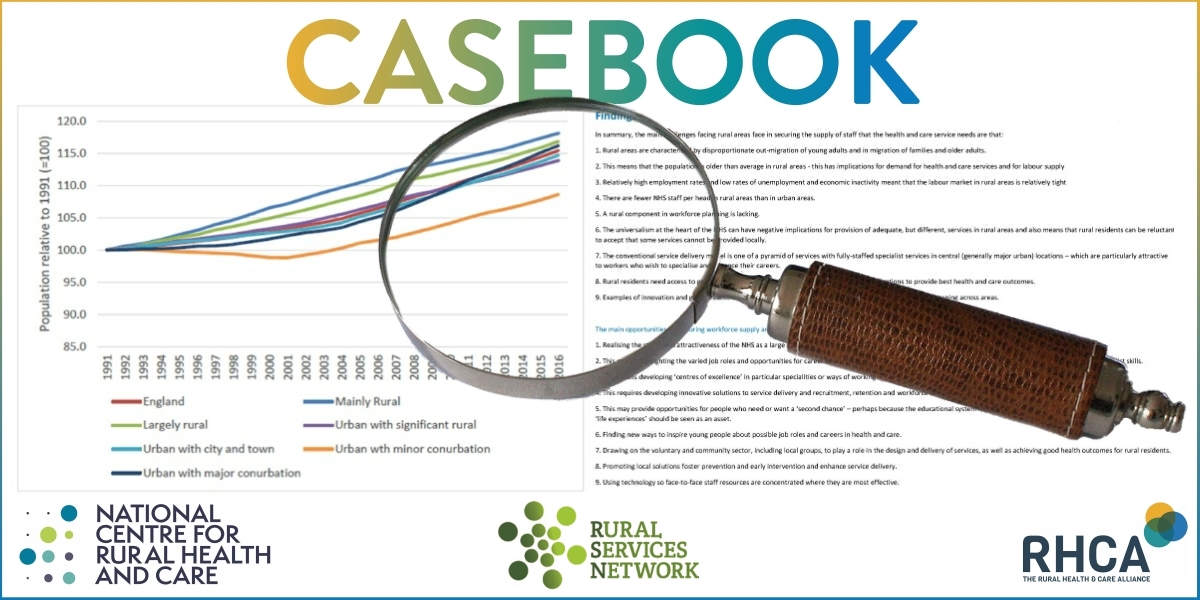T: 01822 851370 E: [email protected]
Visit RSN Survey about life in rural England to find out more.
May Edition of Casebook from the Rural Health and Care Alliance

May 2024 Edition
In this edition of Casebook we focus on the importance of digital connectivity in health and care provision in articles from BT and the Good Things Foundation; the benefits of local collaboration in designing health solutions; debate from the House of Lords on rural pharmacies; the growing need for rural supported housing; and an events update. Read on to find out more…
Telecare - Adjustment to digital switchover announced
BT Group has announced significant adjustments to its digital switchover programme, which aims to transition the UK's traditional analogue landlines to digital Voice over IP (VoIP) technology by January 2027. The revised approach will result in a single switch for most customers - from copper to fibre with all customers now expected to have moved off the old analogue PSTN by the end of January 2027.
This comprehensive switchover plan is part of a broader effort to prepare the country for a full-fibre future, aligning with the UK Government’s gigabit connectivity goals.
BT’s phased regional rollout plan for Digital Voice includes extensive awareness campaigns and local support to ensure customers understand the changes and are prepared for the switch. The transition to digital landlines is a pivotal step towards a fully connected, fibre-based future, supporting the UK’s broader gigabit connectivity ambitions.
For further information, read BT's official announcement in full.
This announcement delays the deadline for the switchover from 2025 to 2027.
Howard Watson, Chief Security and Networks Officer, BT Group, said:
“The urgency for switching customers onto digital services grows by the day because the 40-year-old analogue landline technology is increasingly fragile. Managing customer migrations from analogue to digital as quickly and smoothly as possible, while making the necessary provisions for those customers with additional needs, including telecare users, is critically important.
“Our priority remains doing this safely and the work we’re doing with our peers, local authorities, telecare providers and key Government organisations is key. But more needs to be done and we need all local authorities and telecare providers to share with us the phone lines where they know there’s a telecare user.”
For more information about the BT Voice Digital Switchover, please visit: https://www.bt.com/broadband/digital-voice
Kerry Booth, Chief Executive, Rural Services Network
"We are pleased that BT is delaying the switchover to digital lines to ensure that the most vulnerable are not left behind. This delay provides a crucial window for implementing the Shared Rural Network and improving the mobile network, which we anticipate will benefit rural communities significantly by then. Ensuring that all rural residents have reliable and efficient digital services is a priority, and we welcome BT's efforts to engage and support vulnerable communities throughout this transition."
The impact of local area coordination
The recent multi-site evaluation of Local Area Coordination (LAC) in England and Wales, funded by the National Institute for Health and Social Care Research and conducted in collaboration with leading universities, presents significant findings that underscore the transformative power of this approach. This research, published last week, is a landmark study, providing a comprehensive understanding of how LAC can make a meaningful difference in people’s lives and communities.
The study, undertaken by the Universities of Hull, Sheffield, York, Exeter, and Leeds, is the first of its kind to evaluate the LAC approach across multiple sites. It highlights the substantial benefits of LAC at individual, community, and systemic levels, showcasing its potential to revolutionise the way we think about and deliver preventive care.
Key Findings:
- Building Trust Through Relationships: One of the most crucial aspects of LAC is the emphasis on developing trusting relationships. Coordinators spend significant time with individuals, understanding their unique circumstances and building rapport. This trust is foundational to the success of LAC, enabling more effective support and engagement.
- Strengthening Community Connections: LAC works by connecting individuals to community resources and support networks. This approach not only reduces social isolation but also fosters a sense of belonging and community solidarity. The study found that these connections significantly enhance the overall wellbeing of individuals.
- Reducing the Need for Formal Care: By addressing issues early and providing continuous support, LAC reduces the reliance on formal care services. This preventive approach helps individuals manage their health and social needs more effectively, preventing crises and reducing the burden on formal care systems.
- Preventing Systemic Loss: Often times, individuals can get lost within the complexities of the health and social care systems. LAC ensures that people are guided through these systems, receiving the support they need without falling through the cracks. This role as a navigator is critical in maintaining continuous and effective care.
The research employed a Participatory Action Research approach, combining system and ward-level analysis, life stories, Qualitative Comparative Analysis, and a Nested Economic Study. These methods provided a holistic view of LAC’s impact and highlighted several critical aspects:
- Individual Impacts: Participants reported increased confidence, independence, and overall wellbeing. The consistent presence and support of Coordinators were pivotal in reducing stress and anxiety, enhancing individuals' capacity to cope with life's challenges.
- Community Impacts: The ripple effect of LAC’s community engagement was evident, with many individuals becoming more active in their communities. This engagement helped build stronger support networks and reduced social isolation.
- Systemic Impacts: LAC’s ability to bridge gaps in the public services system was a key finding. Coordinators effectively connected individuals with services and resources, reducing systemic barriers and promoting a more person-centred approach.
Local Area Coordination in Rural Communities
Rural communities face unique challenges, including limited access to transport, longer distances to medical facilities, an aging population, and healthcare workforce shortages. The findings from this study are particularly relevant to rural settings, where these challenges can significantly impede access to care.
LAC Coordinators act as connectors, ensuring that rural residents can access necessary services and support despite geographical barriers. By fostering local connections and support networks, LAC helps build resilient communities that can support their members more effectively. The emphasis on early intervention and continuous support aligns well with the needs of rural populations, where accessing timely care can often be difficult.
The multi-site evaluation of Local Area Coordination provides compelling evidence of its effectiveness in transforming lives and communities.
- Read the Summary Report Here.
- Read the Full Report Here.
Detailed in the Rural Access to Health and Care Services chapter of the Winning the Rural Vote Campaign, The Rural Services Network is committed to supporting such innovative approaches recognising their potential to address the unique challenges faced by rural and coastal areas. By investing in and expanding the LAC approach, we can make significant strides towards more equitable and effective health and care services for all.
Enhancing rural health access
It was recently Mental Health Awareness Week, during which the Rural Services Network shone a spotlight on the unique challenges faced by rural communities in accessing health and care services. These challenges, ranging from limited transport options to an aging demographic, significantly affect the mental and physical wellbeing of rural populations.
Rural residents often experience greater difficulties in accessing healthcare facilities due to longer travel distances and less frequent public transport services. This not only complicates emergency medical care but also the routine management of chronic conditions and mental health support. The aging population in rural areas, which is growing faster than in urban centres, further strains limited healthcare resources.
Funding Disparities
There is a notable disparity in funding between rural and urban areas, with urban local authorities receiving substantially more per capita for public health and social care services. This funding gap exacerbates the challenges of delivering care in rural regions, where costs are inherently higher due to the geographical spread of the population.
Innovations and Solutions
Addressing these challenges requires innovative solutions and a focus on local service provision. The Rural Services Network advocates for:
1. Enhanced Hospital Access: Improving transportation and accessibility for rural patients, visitors, and staff is essential. Expanding transport schemes could mitigate some of the current barriers to accessing healthcare.
2. Strengthening Local Care: Developing multi-disciplinary health hubs in rural towns can significantly reduce the need for long travel to hospitals. These hubs would provide a range of services locally, from routine check-ups to mental health support.
3. Boosting Public and Mental Health Services: Increasing resources for public and mental health services in rural areas is crucial. This includes addressing the funding disparities and promoting best practices that are tailored to the needs of rural populations.
4. Improving Social Care: Implementing fair funding models is necessary to meet the higher costs of delivering social care in rural areas. Enhancing engagement with local support services can also help in managing the complex health needs of the aging rural population.
5. Addressing Workforce Shortages: There is a critical need for a rural focus in the NHS Workforce Plan. Offering incentives for healthcare professionals to work in rural areas and incorporating rural placements in medical training could help alleviate some of the workforce challenges.
As we observe Mental Health Awareness Week, it is imperative to acknowledge and address the specific needs of rural communities in England. The commitment to improving rural access to health and care services not only supports the physical health of these populations but also their mental wellbeing, ensuring a holistic approach to healthcare that is inclusive of all geographic areas. By focusing on localised solutions and addressing funding disparities, we can build a more equitable healthcare system that truly caters to the needs of every resident.
The impact of rural pharmacy closures
Rural communities in England are currently facing significant challenges due to the closures of community pharmacies, a vital resource for healthcare access in less densely populated areas. The recent peak in these closures prompts a critical evaluation of their impact on the health and welfare of rural populations.
In a recent session in the House of Lords, The Lord Bishop of St Albans inquired about the extent of these closures:
Question:
Lord Markham provided a detailed response illustrating the trend of closures over the past five years:
Answer:
"The below table shows the total number of community pharmacies that have closed and opened in rural areas in England, as defined by the Department for Environment, Food and Rural Affairs’ Guide to applying the Rural Urban Classification to data, each year from 2019 to 2023:
Year
Number of rural pharmacies closed
Number of rural pharmacies opened
2019
13
3
2020
6
1
2021
8
8
2022
8
3
2023
13
8
Community pharmacies are private businesses, contracted to provide National Health Service pharmaceutical services. My Rt hon. Friend, the Secretary of State for Health and Social Care is responsible for ensuring that patients can access medicines, and the Department is monitoring changes to the market closely. In areas where there are fewer pharmacies, the Pharmacy Access Scheme provides financial support to the pharmacies that are present.
Every three years, local authorities in England undertake pharmaceutical needs assessments for their areas, to ensure provision continues to meet their population’s needs. Integrated care boards have regard to those assessments when commissioning services, and where a pharmacy closure impacts access to services, a new contractor can apply to open a pharmacy in the area.
When a local pharmacy closes, patients can choose to access pharmaceutical services through any alternative pharmacy, including any of the over 400 distance selling pharmacies that are required to deliver medicines to patients free of charge. In some rural areas, doctors are permitted to dispense medicines.”
These figures highlight a distressing trend, particularly with the closures peaking again in 2023, impacting rural residents' access to essential pharmaceutical services.
The closure of a local pharmacy impacts rural communities significantly, where distances are greater and access to alternative healthcare services can be limited. In addressing these closures, Lord Markham acknowledges the importance of the Pharmacy Access Scheme and local authorities' role in health service assessment and provision. Additionally, the importance of community pharmacies in rural healthcare ecosystems cannot be understated. They serve not just as points for dispensing medication but also as crucial hubs for health advice and preventative care.
The Lord Bishop of St Albans further questioned the government's assessment of the impact of these closures on access to primary care, highlighting the necessity of understanding and mitigating the broader health implications of these closures:
Question:
Answer:
It is the statutory duty of every local authority in England to undertake pharmaceutical needs assessments for their areas including those that are rural in nature, every three years, to ensure provision continues to meet their population’s needs. Integrated care boards have regard to those assessments when commissioning services and where a pharmacy closure impacts on the access to services, a new contractor can apply to open a pharmacy in the area.
Patients who struggle to access pharmacy premises can access pharmacy services remotely through any of the over 400 online pharmacies that are contractually required to deliver medicines free of charge. Alternatively, in some rural areas, doctors are permitted to dispense medication to patients.
The Pharmacy Access scheme provides additional funding to pharmacies in the areas where there are fewer pharmacies.
The closures of rural pharmacies are a symptom of broader challenges in healthcare provisioning in rural areas. The direct impact of these closures on health access necessitates immediate and proactive policy interventions.
The Rural Services Network's campaign "Winning the Rural Vote" advocates for tailored solutions to address the healthcare disparities faced by rural communities. Enhancing accessibility, increasing the availability of health services through multi-disciplinary health hubs, and addressing workforce shortages in rural healthcare are pivotal. These measures are crucial to ensure that rural residents receive the same standard of care as those in urban areas.
Bridging the digital divide – enhancing rural digital inclusion
In an increasingly digital world, rural areas in England still face significant barriers to digital access and inclusion. "The Economic Impact of Digital Inclusion in the UK", a report recently published and commissioned by Good Things Foundation, emphasises the urgent need for enhancing digital skills among the rural and elderly populations to foster economic growth and social inclusion.
Rural communities continue to lag in digital connectivity, with substantial portions unable to access high-speed internet or reliable mobile coverage. This digital gap significantly affects older demographics prevalent in rural regions, who are also the least likely to possess necessary digital skills.
The report highlights several key benefits of digital inclusion:
- Economic Growth: Enhanced digital skills drive productivity and facilitate access to new job markets, particularly vital in rural areas where traditional industries may be declining.
- Healthcare Access: Digital skills can greatly improve access to healthcare services, reducing the need for travel and providing remote consultation options.
- Social Inclusion: For many elderly residents, digital connectivity offers a critical link to social interactions and services, helping to reduce feelings of isolation.
Investing in digital skills training presents a strong economic case. The report details that for every £1 invested in digital inclusion initiatives, nearly £10 returns to the economy through various channels, including increased productivity, reduced healthcare costs, and greater social cohesion.
You can download the report infographic by clicking on the image below:
Kerry Booth, Chief executive, Rural Services Network:
"As we strive to empower rural communities and secure their interests, addressing the digital divide is paramount. Enhancing digital inclusion is not just about technology; it's about ensuring equitable access to opportunities, healthcare, and social connections. By bridging this gap, we amplify the voice of rural areas in the national dialogue, reinforcing the pivotal role of the 'Winning the Rural Vote' campaign in shaping policies that reflect the unique needs and aspirations of rural populations."
Addressing the future of supported housing needs
The latest research commissioned by the National Housing Federation (NHF) reveals critical insights into the future demand for supported housing in England by 2040. With an aging population and increasing needs for varied support services, a significant expansion of supported housing is necessary to prevent thousands from facing inadequate living conditions or homelessness.
Current State of Supported Housing
As of 2023, England has 509,873 supported housing units managed by registered social housing providers, most of which cater to older adults. The report emphasises the importance of supported housing, which enables individuals from various vulnerable groups, including those with disabilities, homeless individuals, and survivors of domestic abuse, to live independently and with dignity in their communities.
Projected Needs by 2040
The NHF report projects a stark 33% increase in demand for supported housing by 2040, translating to an additional 167,329 units required to meet the needs of a growing and aging population. This increase is not just about numbers; it’s about ensuring quality of life and independence for our society’s most vulnerable.
The development costs for these additional units are estimated at £33.9 billion, with annual support costs expected to rise by 58% from 2024 levels. The financial stakes are high, but the cost of inaction is higher, potentially leading to increased strain on the NHS and social services.
Rural Affordable Housing: A Parallel Crisis
Rural communities face unique challenges: high house prices, limited social rented housing, and a surge in short-term holiday lets that exacerbate housing shortages. This rural housing crisis not only threatens the sustainability of these communities but also their economic vitality.
The NHF advocates for a long-term national housing plan that integrates the development of supported housing. Alongside this, the emphasises the necessity of incorporating rural housing needs into broader national strategies. This includes adapting policies to allow for the construction of affordable homes on smaller rural projects and ensuring that local needs for housing are met without displacing them to distant areas.
As we approach 2040, it is imperative that housing strategies encompass both urban and rural needs, recognising the essential role of supported housing in maintaining the health and well-being of the population. There is a need for comprehensive policy-making that addresses the spectrum of housing needs across England. By planning thoughtfully and inclusively, we can ensure that no one is left behind in our efforts to provide safe, affordable, and supportive housing for all.
Housing Insights on the RSN website has now been updated with an analysis examining housing affordability. It provides for the chosen authority the ratio of median house price to median gross annual workplace-based earnings.
In 2022, houses in Predominantly Rural areas were less affordable to purchase for those in the bottom 25% of earners in Predominantly Rural areas than for the bottom 25% of earners in urban areas.
Affordability of housing across England fell in 2021 to the lowest level in ten years based on this measure. There has been some improvement to this situation in 2022 and 2023, but the lack of affordable housing in rural communities continues to be an issue, and it is important for the sustainability of communities that key workers are not squeezed out of the areas that they serve. Explore this analysis further here.
Free Event, Rural Catalyst: Re-imagining health and social care in rural communities
An in-person workshop to be held in Morpeth on 6 June aims to explore creative opportunities to re-imagine health and social care in rural areas. It will bring together key stakeholders with diverse perspectives to discover and re-design new approaches to tackling existing challenges in rural, remote and coastal health and social care. To find out more about the event and book your free space, click here.
Directors of Public Health meeting notes
In recent weeks Directors of Public Health rural and coastal communities came together to:
- Share ideas and current areas of work
- Explore the potential for an ongoing group to work on issues and explore solutions in more detail
- Consider whether there would be value in some on-going collaboration in this area for sharing good practice and possibly engaging in dialogue with policy makers and national bodies
The session was facilitated by the National Centre for Rural Health and Care and the Rural Services Network. Click here to view notes from the meeting, and if you have any data analysis or working solutions you would like to share please email [email protected].
We’d love to hear from you - share what you’re proud of
If you have something, you would like us to feature in a future edition, please let us know by clicking here to send us an email.
Spread the word
If you know of other organisations that you think would benefit from joining the Rural Health & Care Alliance, please click here to email us and let us know.
RURAL SERVICES NETWORK
Up to date news on Health and Care
The Rural Services Network provides a useful source of themed news content and data. Check out the latest news on Health & Wellbeing and Vulnerability, where you’ll find articles on a diverse range of rural issues affecting rural communities. You might also find this research on Over 65 Population Projections useful too.
Latest from RSN Member Insights
RSN Member Insights is the place to discover the statistics that define communities within our membership. It is regularly updated with new analyses, and these will be highlighted in the 'What's New' section of the RSN's Weekly Rural Bulletin. The Rural Bulletin also provides a selection of the most rurally topical news items, so do subscribe and encourage your colleagues to subscribe to what is an invaluable weekly periodical.
To make a suggestion of data that would benefit you by being included in the Member Insights section, please email Dan Worth, our Research and Performance Analyst, at [email protected].
| The Rural Health & Care Alliance is a membership organisation administered by the Rural Services Network on behalf of the National Centre for Rural Health & Care. Explore the RHCA service below: |
 |
 |
 |
 |
 |
 |
 |
 |
 |
 |












